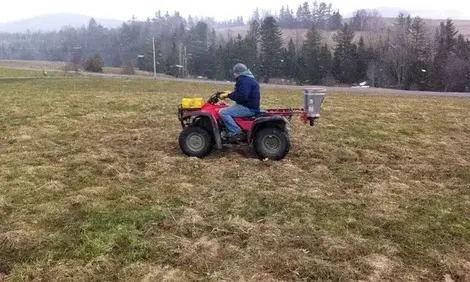



Four soil nutrient and herbicide considerations for 2022
A “black swan” is an unpredictable event with potentially catastrophic consequences, which may be a fair description of 2022.High fertilizer prices, herbicide shortages and badly clogged supply chains make this a year of challenges for crop production, writes Ev Thomas with The William H. Miner Agricultural Research Institute in New York, USA.
Following are four important considerations for this Spring:
1. Nitrogen applications on grass-alfalfa fields
Farmers have a lot to think about this spring as they consider what to do with their grass-alfalfa fields (less than 50% alfalfa), a decision which may be influenced by the uniformity of the alfalfa in the field. The decision would be easier if alfalfa would die off uniformly, leaving a similar amount of alfalfa throughout the field. But what you’ll probably find are parts of the field where the alfalfa is still going strong while in other places it’s long-gone. It's probably not practical to fertilize the various areas separately, so your decision would be to not apply any nitrogen, or to apply it across the entire field. We got good results at Miner Institute by applying 40-50 lbs. of N/acre — equivalent to 100 lbs. of urea — to our grass-alfalfa fields. As we’ve noted before, nitrogen will not harm your alfalfa and may slightly increase its yield, but with N around a buck a pound don’t apply N to fields with over 50% alfalfa: Stay off these fields until first cut, then after the first crop is off apply 0-0-60 at a rate determined by soil test, either alone or blended with sulfur. Don’t forget boron, though this should also be based on soil analysis. Topdressing these fields with manure may be an option, but note the cautions mentioned in the next item.
2. Is UAN32 a viable substitute on some fields?
Straight grass fields need N as soon as you can get on the field after the grass breaks winter dormancy. High soybean meal prices will make home-grown protein a premium in 2022. Miner Institute research found that 100 lbs. of N per acre at spring green-up doubled grass yields and increased crude protein from 12% to 18%. But what if 100 lbs. of N costs about $100? UAN32 is slightly more efficient than urea but costs about a dime more per pound of N. It’s still worth fertilizing your good grass fields with N, but perhaps back off to about 70 lbs. of N. I have no research data supporting this lower rate. Topdressing grass fields with liquid or slurry manure is an option, but not if it means rutting up your fields — especially those you want to maintain as grass. (Our experience is that long established reed canarygrass fields are less likely to be rutted up by heavy equipment.) You also need to consider what else you could be doing instead of the time consuming process of spreading manure on soft ground.
3. Fertilizer orders
Some fertilizer retailers are (understandably) scared of taking on a big inventory of high-priced fertilizers in case prices decline; some are only buying enough to satisfy confirmed or prepaid orders. Therefore, it’s important to work closely with your fertilizer dealer, and this year don’t assume that you’ll be able to buy whatever you want whenever you need it.
4. Glyphosate availability
If you ordered Roundup-Ready corn or soybean seed make sure that either you or your custom spray applicator have enough glyphosate. (And “have” means actual possession of the herbicide.) We don’t know what the situation will be by the time you head for your fields this spring, but the 2022 supply situation for this crucial herbicide — the most widely used one in the world — is shaky at best. The question doesn’t seem to be whether there will be a glyphosate shortage but how severe it will be. The shortage has been made worse by recent manufacturing problems at a U.S. glyphosate production plant. And for glyphosate coming in from China (its leading manufacturer), the Northeast is a very long way from the California Ports of Entry, which continue to have about 100 container ships sitting off shore waiting to be offloaded.
TheCattleSite News Desk


